A State Divided: The Civil War Letters of James Calaway Hale and Benjamin Petree of Andrew County, Missouri , 1862-1865, by Tonya Graham McQuade, is now available for purchase on Amazon.com.
Amazon Book Description:
"A State Divided: Civil War Letters of James C. Hale and Benjamin Petree is a delightful journey into the mid-1800s and the Hale/Petree family. It is a history of the times. It is a history of a family. It is easy to read and easy to understand – one of the top books in its genre." (See FULL REVIEW HERE)
- Kathy Ridge, Lead Genealogist, Andrew County Museum
“These letters tell remarkable tales that put the conflict into real perspective and offer a striking example of what loyal Missouri men fought for and worried about as the war continued. Of particular interest is Hale’s letters as a member of the Veteran Reserve Corps, one of the few collections documenting how disabled and wounded soldiers augmented U.S. military strength. Hale’s and Petree’s letters, crafted together with readable commentary and insightful context from editor Tonya McQuade, provide invaluable insight into the daily lives of soldiers, how they perceived the United States Civil War, and how that conflict impacted their families in Missouri.” (See FULL REVIEW HERE)
- Neil P. Chatelain, Assistant Professor of History, Lone Star College – North Harris
A State Divided: The Civil War Letters of James Calaway Hale and Benjamin Petree of Andrew County, Missouri presents fifty previously unpublished Civil War letters written between 1862-1865 and explains the context in which these two Missouri soldiers and their families found themselves living, both before and during the Civil War, as they watched discord, destruction, and bloodshed erupt all around them.
Missouri was a state torn apart by political disagreements and violence even before the firing on Fort Sumter in April 1861. While the Missouri Compromise of 1820 helped to postpone the Civil War for four decades, the Platte Purchase, the Kansas-Nebraska Act, the Dred Scott case, and the “Bleeding Kansas” border wars – all of which played out here – added fuel to the fire. Many believe the Civil War truly started in Missouri. Some of the war’s first blood spilled on its soil, and the state even found itself with two competing governments: one supporting the Union; the other, the Confederacy.
Originally from Tennessee and Indiana, Hale and Petree each had relatives who fought and died on both sides of the war. Hale volunteered early on to join the Union army, seeing action in Missouri, Kentucky, and Arkansas before spending much of his enlisted time at Benton Barracks in St. Louis, first in the General Hospital and later in the Veteran Reserve Corps. Petree was drafted late in the war and found himself participating in Gen. William Tecumseh Sherman’s Carolinas Campaign, during which he saw huge amounts of devastation and destruction before marching in the celebratory Grand Review of the Union Army in Washington. D.C.
Their letters – primarily addressed to James’s daughter, Mary Ann, and Benjamin’s brother, Bailis – provide vivid details, interesting accounts, and unique perspectives into their lives and experiences during the war. The book’s added historical details and explanations make clear the important role Missouri played in the Civil War – a state that saw 42% of the battles in the U.S. during the first year; suffered more than 1000 engagements on its soil, many of those involving guerrilla warfare; and experienced one of the last surrenders – 47 days after Lee surrendered to Grant at Appomattox.
Author Tonya Graham McQuade, the great-great granddaughter of Bailis and Mary Ann Petree, invites you to discover more about the experiences of these two Missouri soldiers as they march and drill with their regiments, avoid several close calls with guerrillas and enemy troops, witness the buildup to the Vicksburg Campaign, get an in-depth look at wartime St. Louis, trek with Sherman through the Carolinas, ponder the devastation they encounter, celebrate victory in Washington, D.C., and spend a lot of time sitting around camp, longing to be home, writing letters to their families.
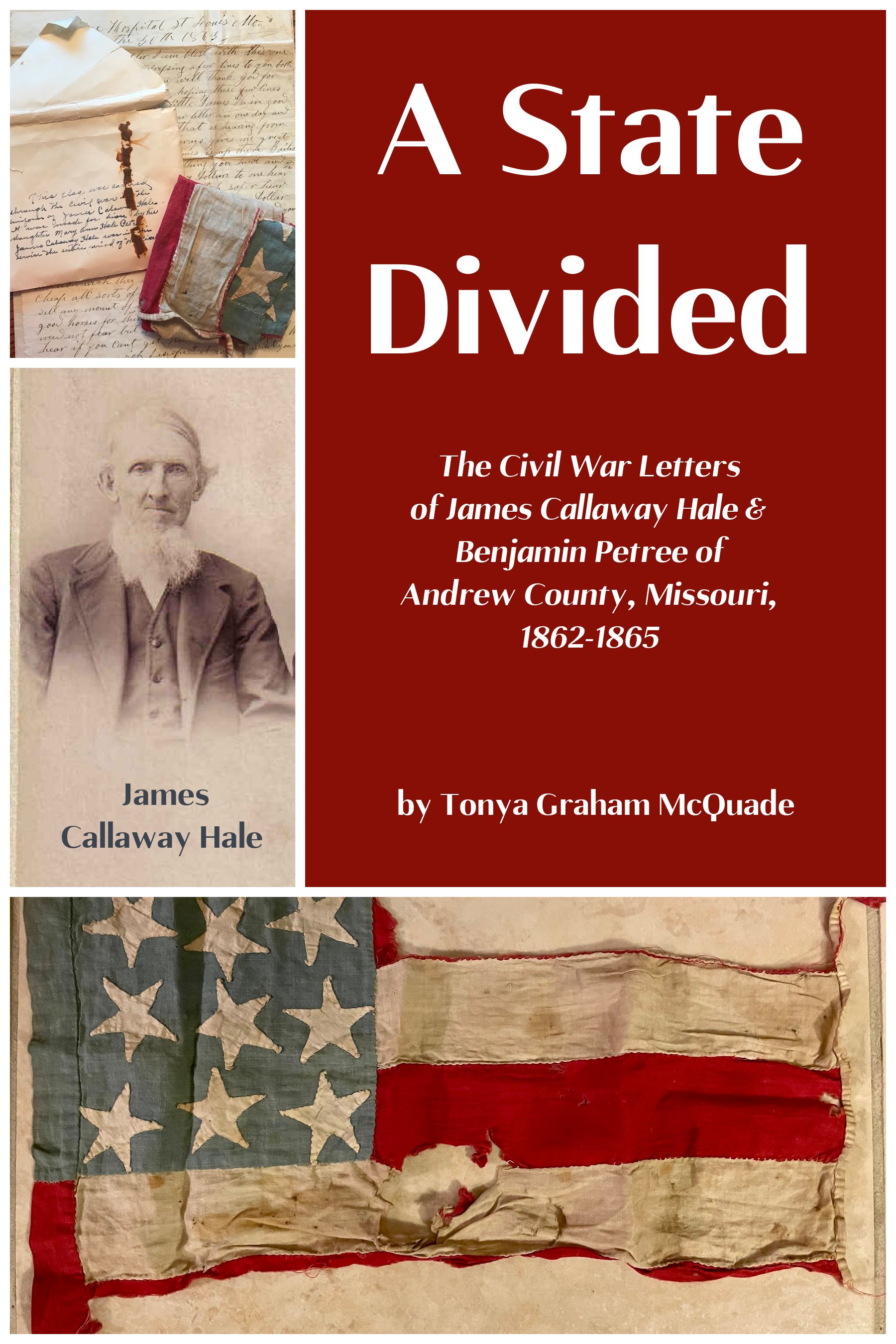
Front Cover - A State Divided

Letter written by James Calaway Hale, along with flag sewn for him by his daughter, Mary Ann Hale Petree, which he carried with him throughout the war (as labeled on the envelope by his granddaughter, Lettie Petree Bragg)
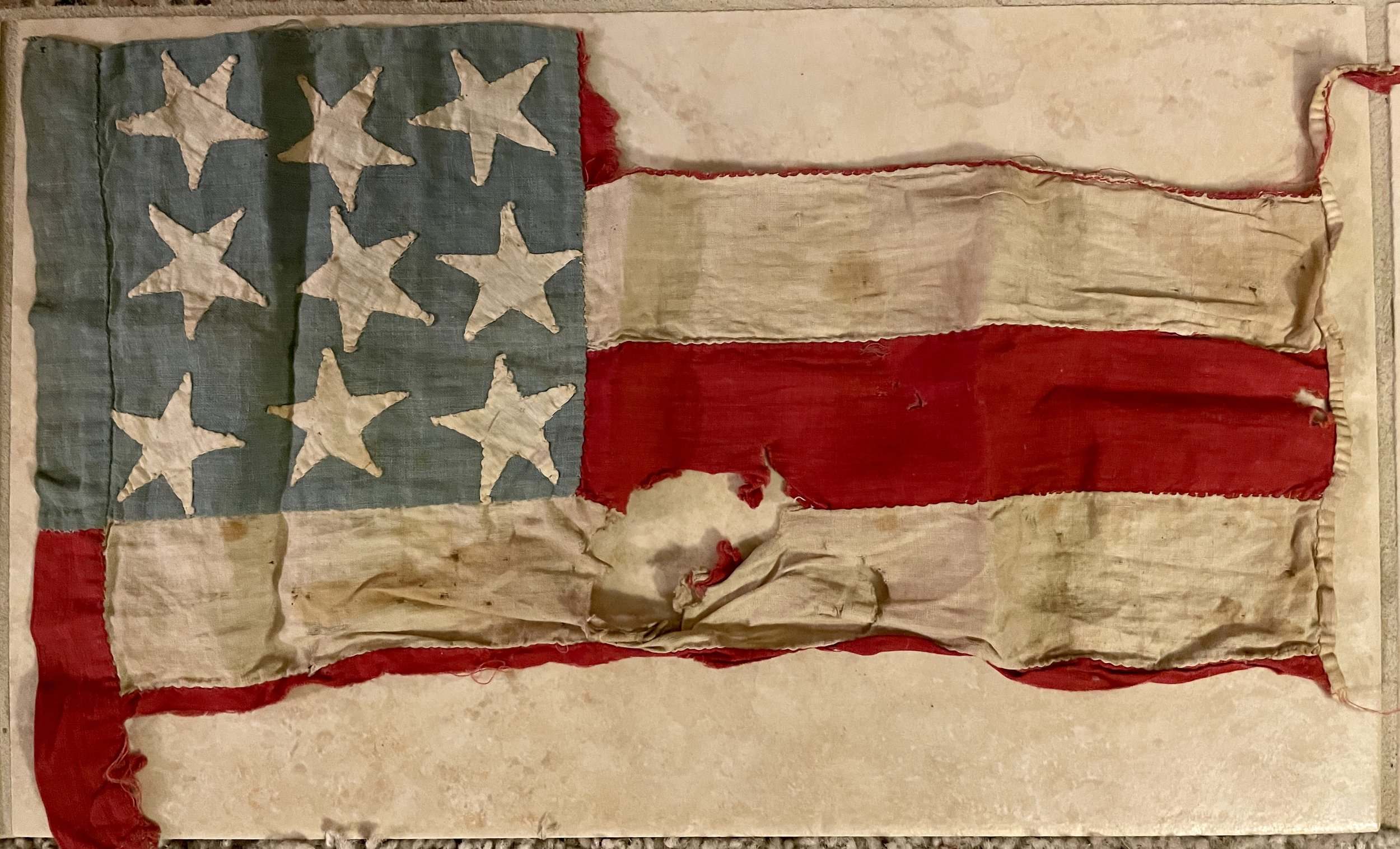
Mary Ann Hale Petree sewed this 9" x 14" flag for her father
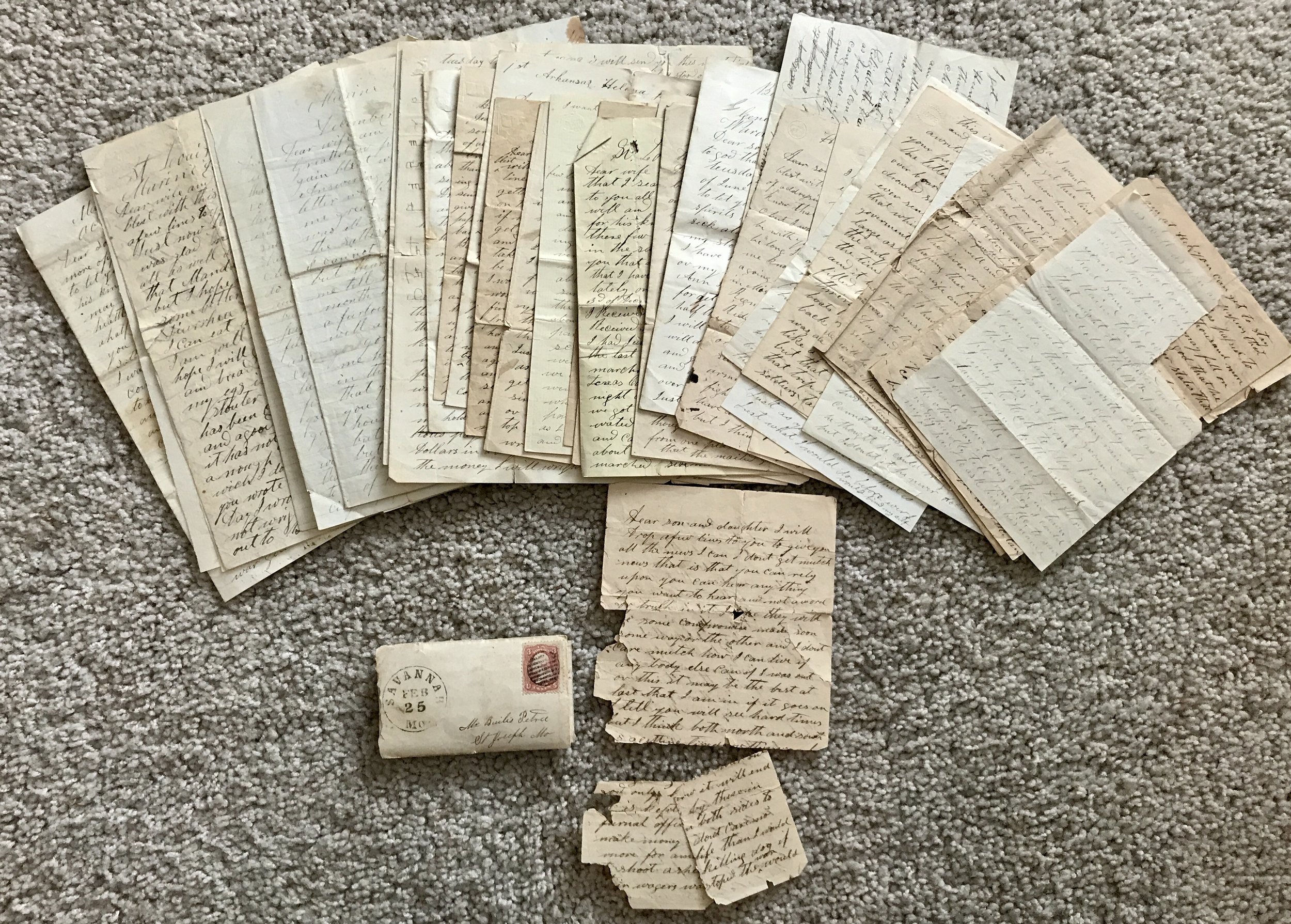
Some of the family letters written by James Calaway Hale and other family members

The first (and most faded) letter written by James Calaway Hale, dated October 2, 1862, from Rolla, Phelps County, Missouri

The oldest letter in the box, written by my 4th great grandfather, John Brown, to son-in-law James Calaway Hale & daughter Elizabeth (Brown) Hale, from the State of Tennessee, Washington County, dated March 22, 1846

Some other items that were in the box Jeremy sent me - including old tintype photos, notes, and pieces of materials and dresses some of my relatives wore

James C. Hale's eyeglasses (labeled by granddaughter Lettie Petree Bragg)

My father trying on his great-great grandfather's glasses
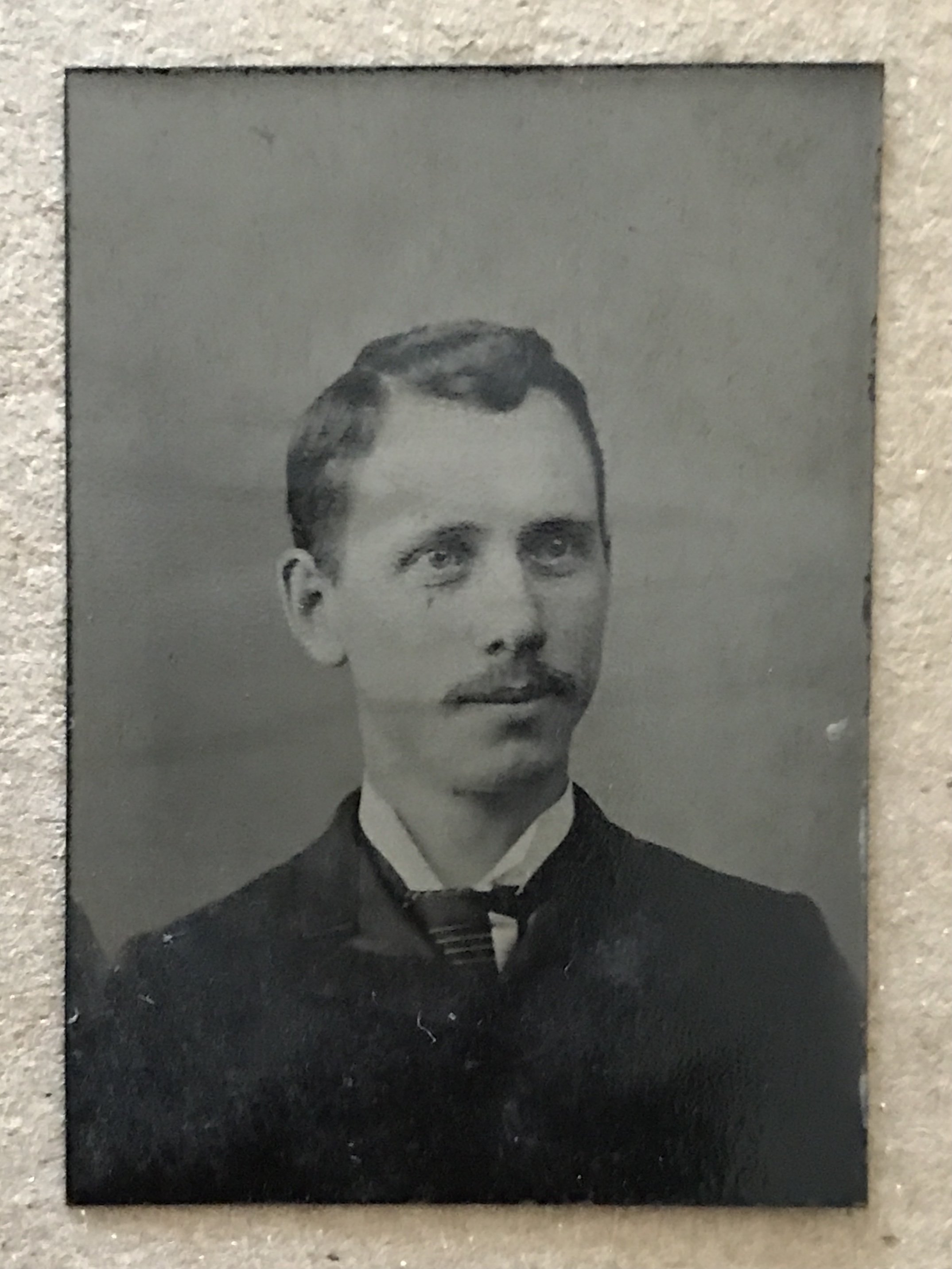
Unidentified tintype photo - possibly Benjamin Petree

Old tintype photo - possibly of Mary Ann Hale and her three sisters (before one of them died in 1860); the word "Mother" is written above the girl on the left, which could be Mary Ann (the oldest of the four)

This photo is labeled "McDonald" on the back, so it is likely a photo of Mary Ann's brother, McDonald Meshack Hale

Unidentified tintype photo, probably McDonald, Mary Ann, and Amanda Hale; this photo was accompanied in an envelope by a piece of material from the dress one of the girls was wearing
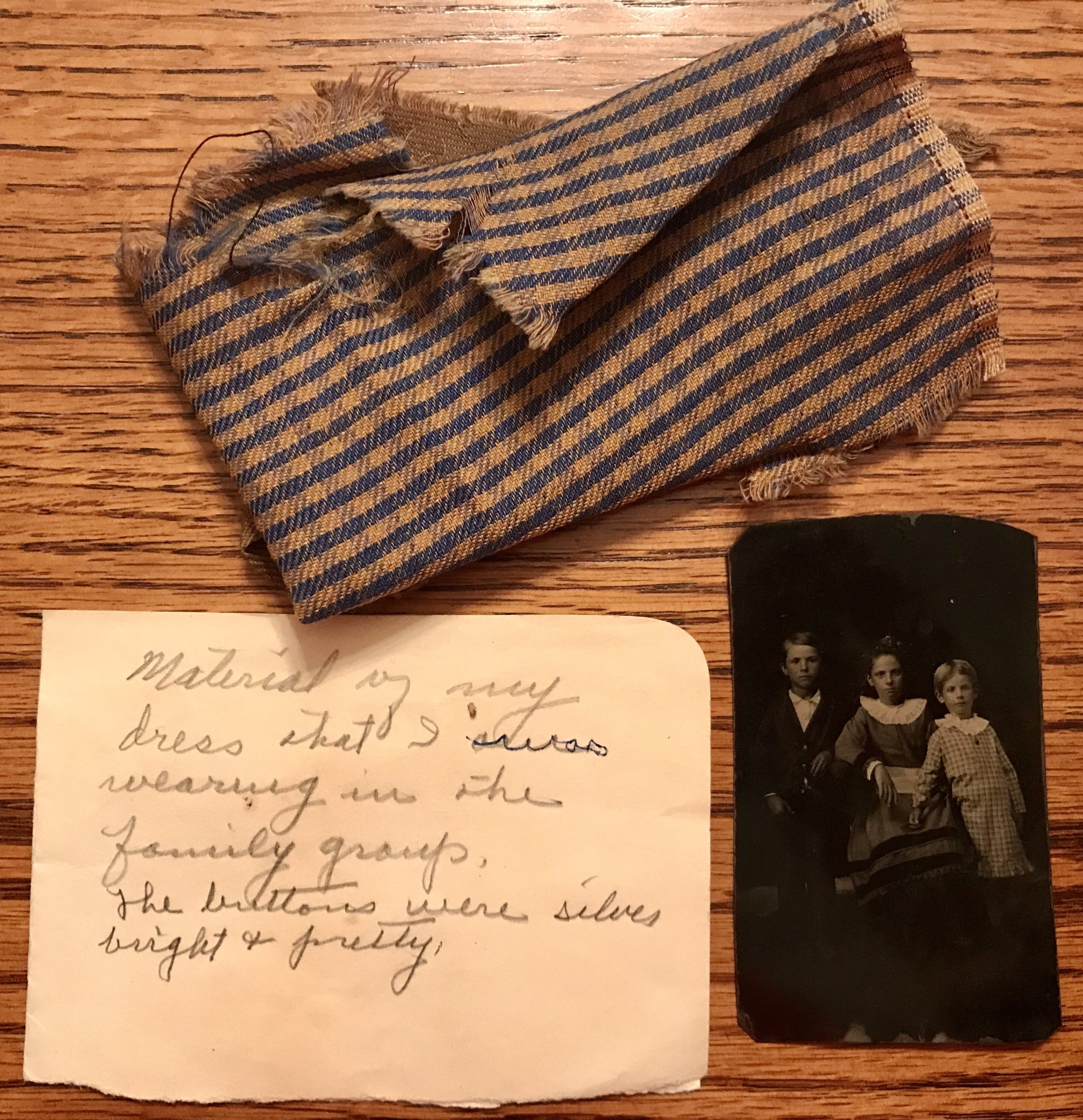
Note reads: "Material of my dress that I was wearing in the family group. The buttons were silver, bright & pretty"

Unidentified photo of a young girl, possibly Amanda

Material from the dress of Bailis and Benjamin Petree's mother, Mary Snowden Petree Note reads: "1957 - Aunt Lucy Earls Petree, wife of Benjamin Petree, took care of Grandfather's (Henry Petree's) trunk of special keepsakes for some years before he remarried and after. When I was visiting my Aunt Lucy when I was 14 years old, she gave me this piece of Grandmother's (Mary Snowden Petree's) dress - the square cut from this piece was given to my sister Lizzie Hatcher. It is now very old. Aunt Mollie (Petree) was the baby of the family, 5 older children born in 1842 - 1957 - 115 years - perhaps, 30 years old. L.P.B. (Lettie Petree Bragg)" This last part of the note is a bit confusing. I'm not sure why Lettie brings up Mollie Petree - perhaps the other material is from one of her dresses, possibly worn when she was 30 years old. Mollie was born in 1842 and was the youngest of Henry Petree and Mary Snowden Petree's six children. Mary died in 1844; Mollie, in 1901. It had been 115 years since she had been born when Lettie wrote this note.

James Calaway Hale's Family Tree

This letter, written by Mary (Kincheloe) Hale (1777-1866) to son James Calaway Hale from Greene County, Tennessee, is dated June 12, 1850, and includes a list of family names, birthdays, and death dates
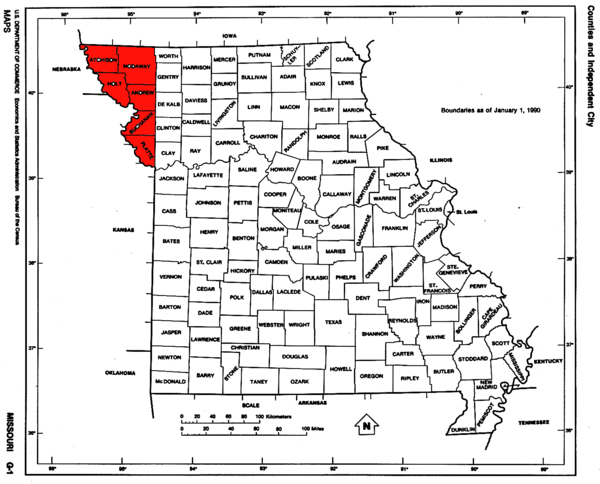
This map of Missouri's counties shows the 1836 Platte Purchase, which extended Missouri's border, in red; Andrew County is located here
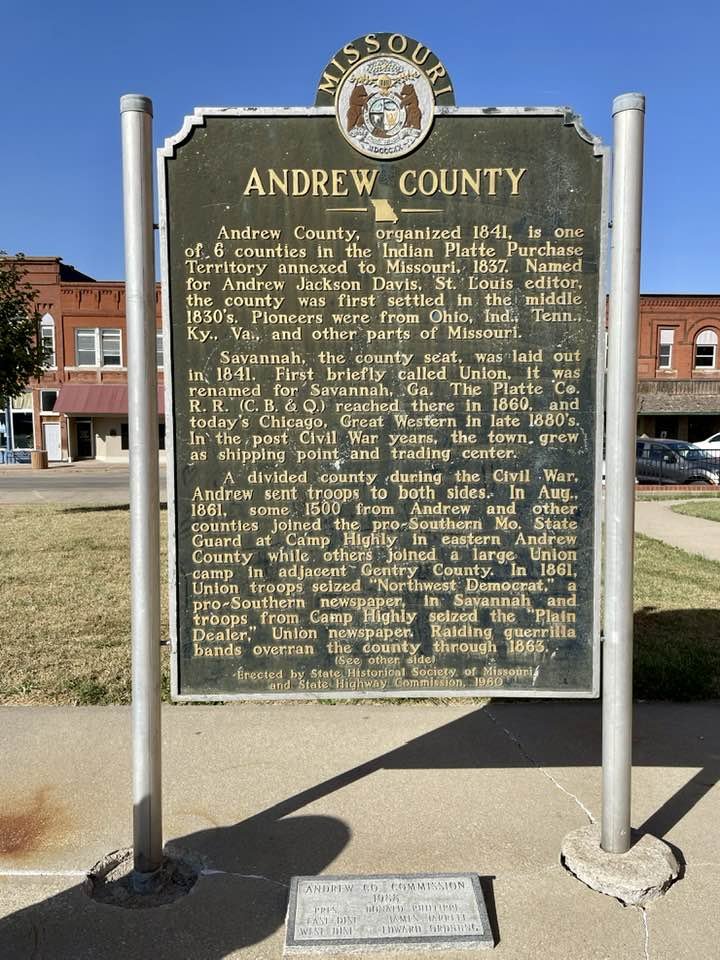
Sign in St. Joseph, Missouri, explaining some of Andrew County's history during the Civil War

Display at the Andrew County Historical Museum about the Civil War and how it impacted Andrew County

Unidentified photo of a soldier in the Missouri 33rd Infantry, the same regiment as James Calaway Hale
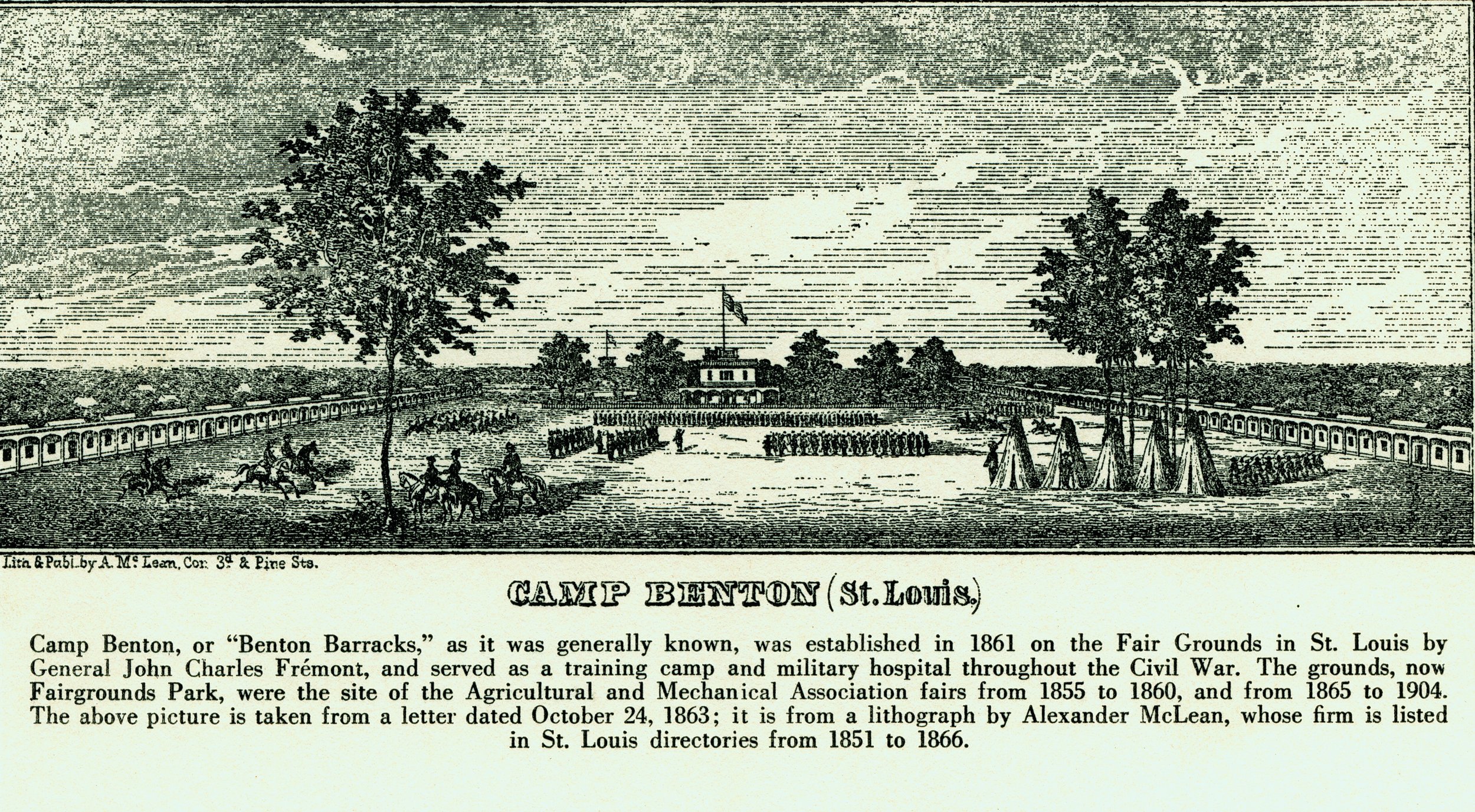
Illustration of Camp Benton, aka. Benton Barracks, in St. Louis, MO, to which James initially reported and where he later spent two years

Map showing "The Marine," aka. the Marine Hospital, where James spent a lot of his time while he was in the Veterans Reserve Corps

Poster - "Men Wanted for the Invalid Corps" (the original name of the Veterans Reserve Corp)

Cover of book titled "Fearless Purpose," containing the letters of Civil War Nurse Emily Parsons, who served at Benton Barracks General Hospital during the same time the James was there
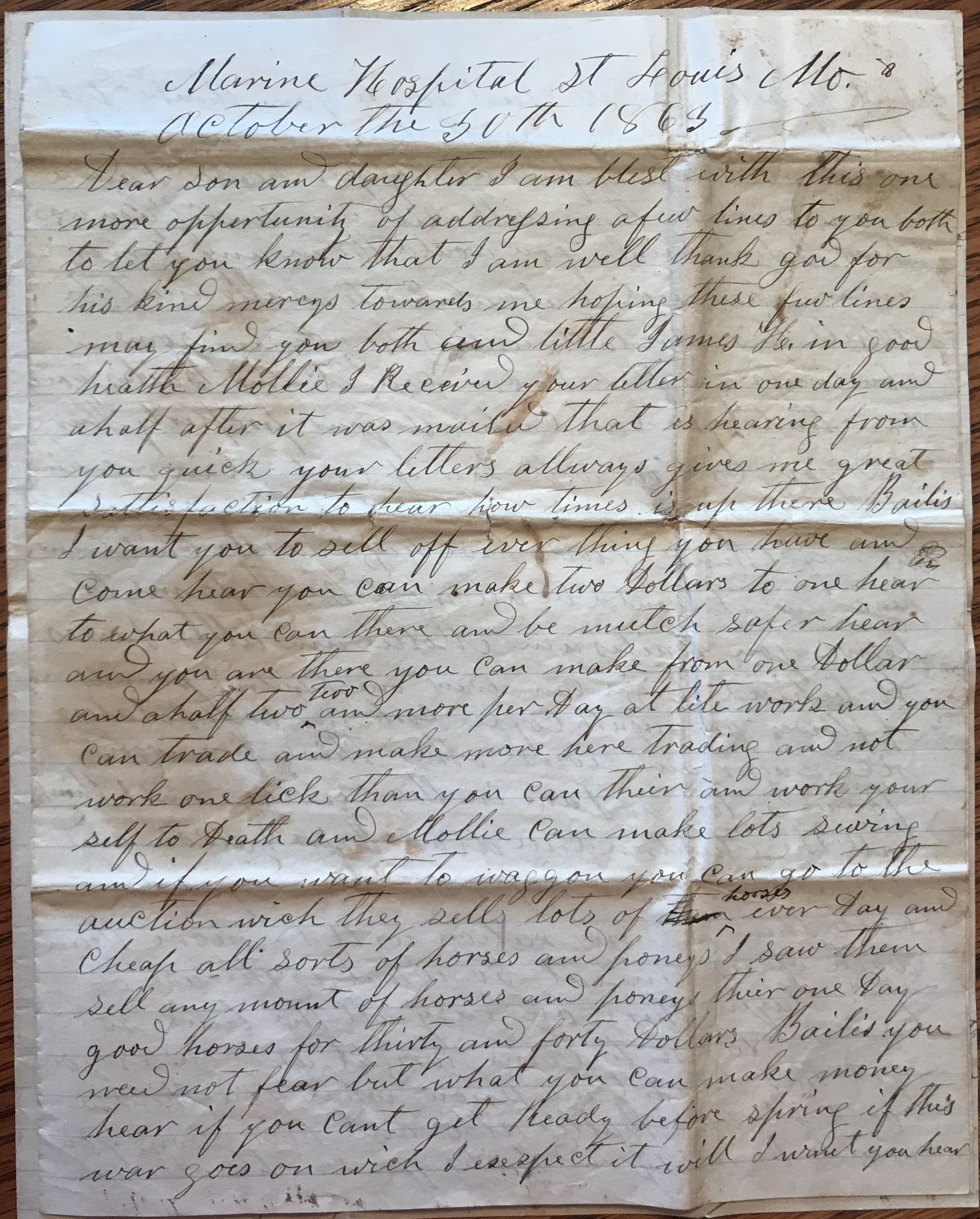
Letter written by James C. Hale, written from the Marine Hospital in St. Louis on October 11, 1863

Headstone at Fillmore Cemetery in Andrew County for James C. Hale, his wife Elizabeth, and daughter Amanda
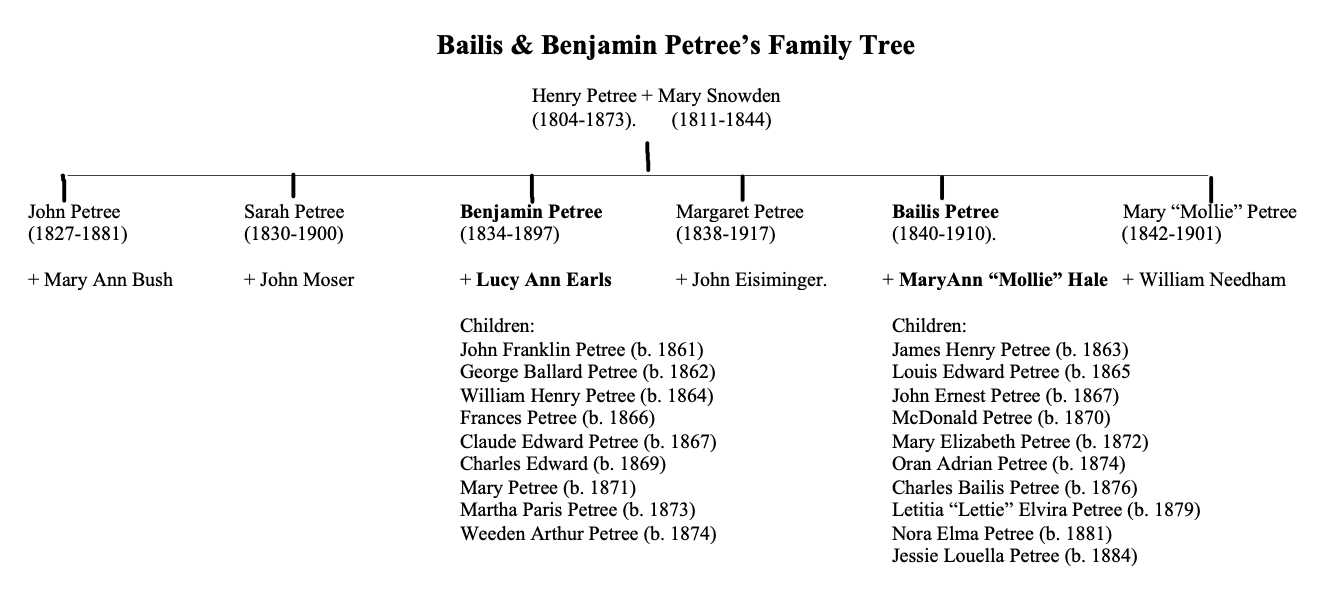
Bailis & Benjamin Petree's Family Tree

Letter written by Benjamin Petree in June 1865 from Kentucky

Photo of Bailis Petree
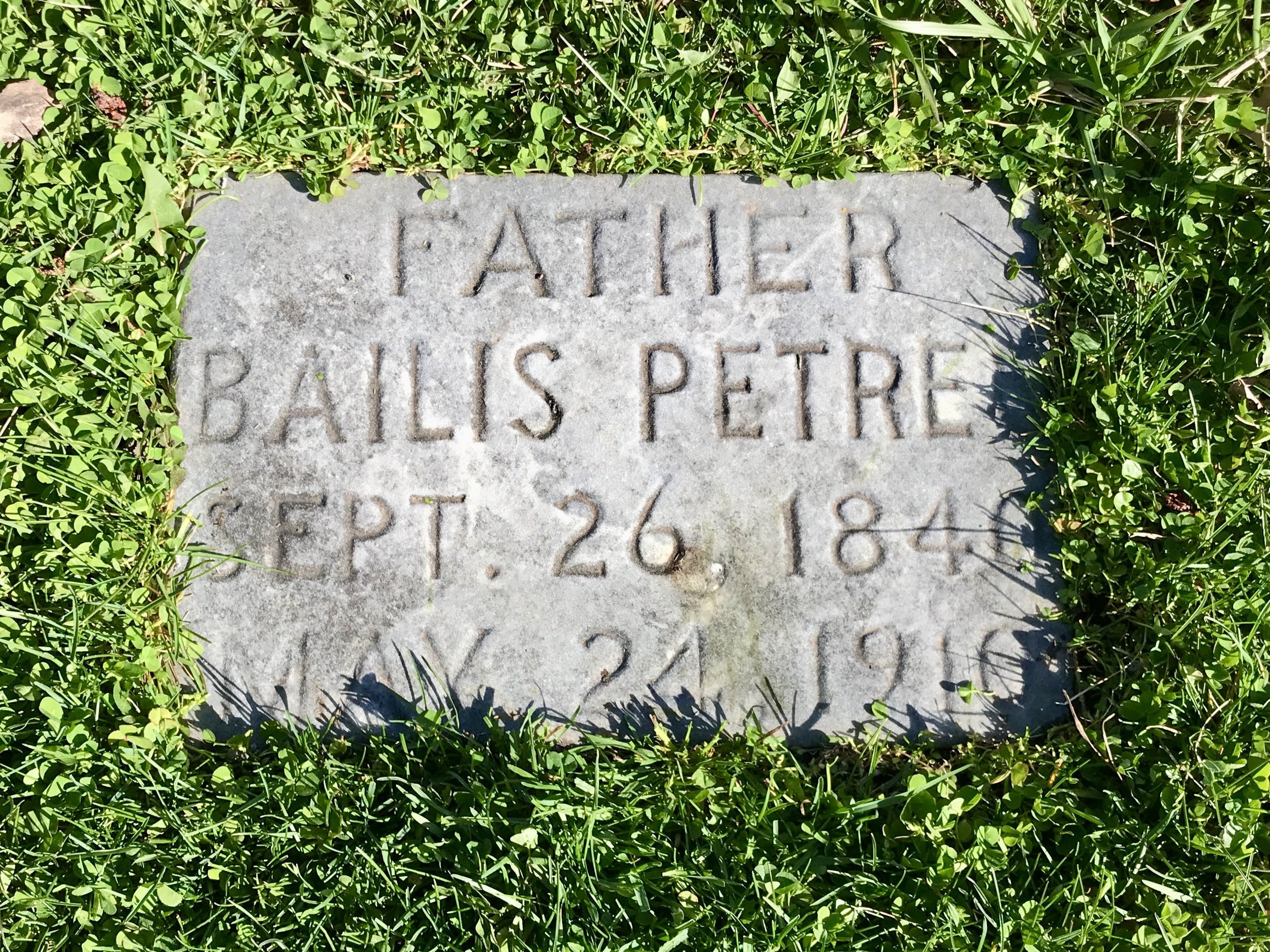
Gravestone for Bailis Petree at Highland Park Cemetery in Kirksville, Missouri
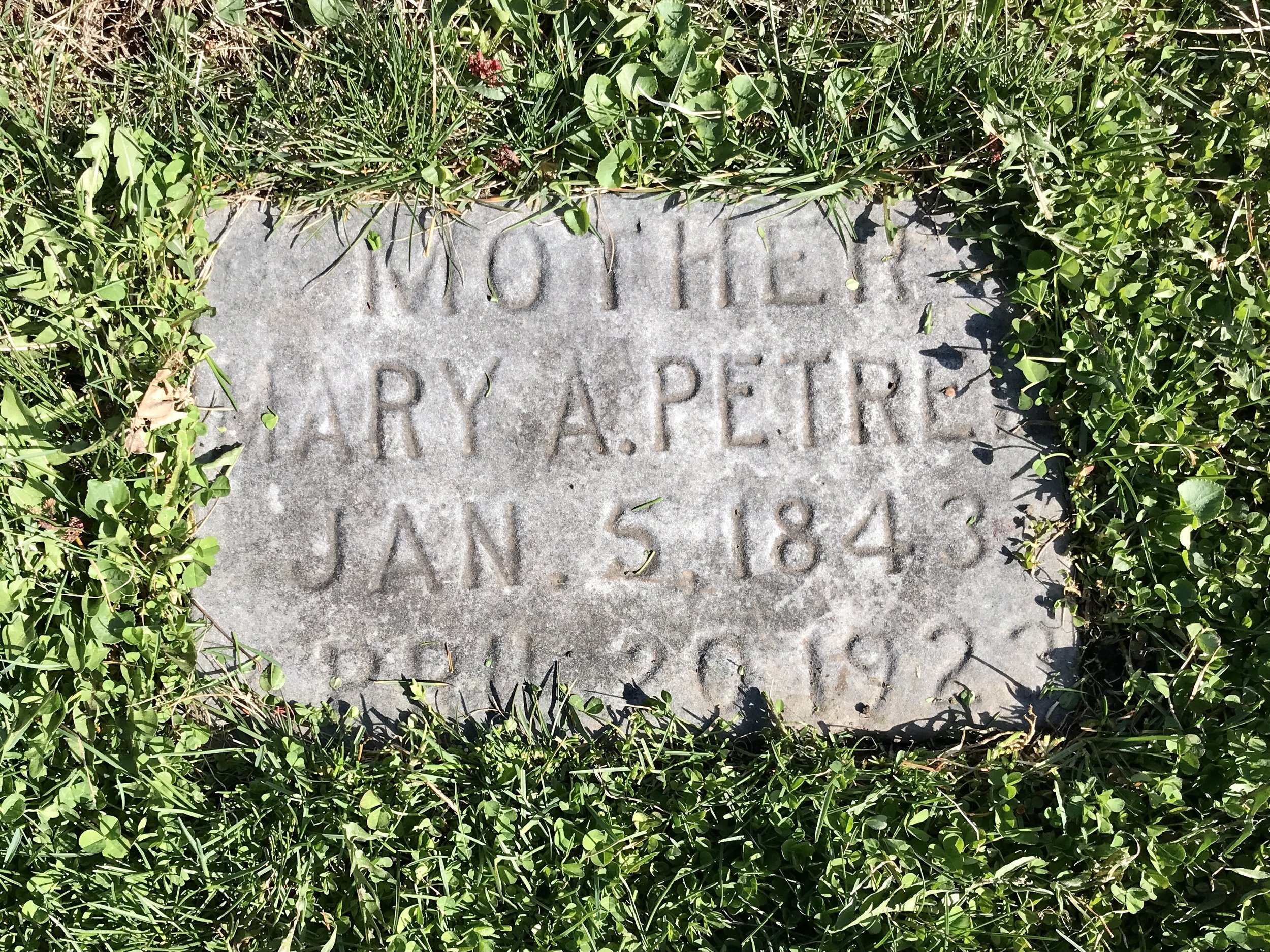
Gravestone for Mary Ann (Hale) Petree at Highland Park Cemetery in Kirksville, Missouri

Photo of me with Bailis & Mary Ann's gravestones during my visit to Kirksville in April 2022
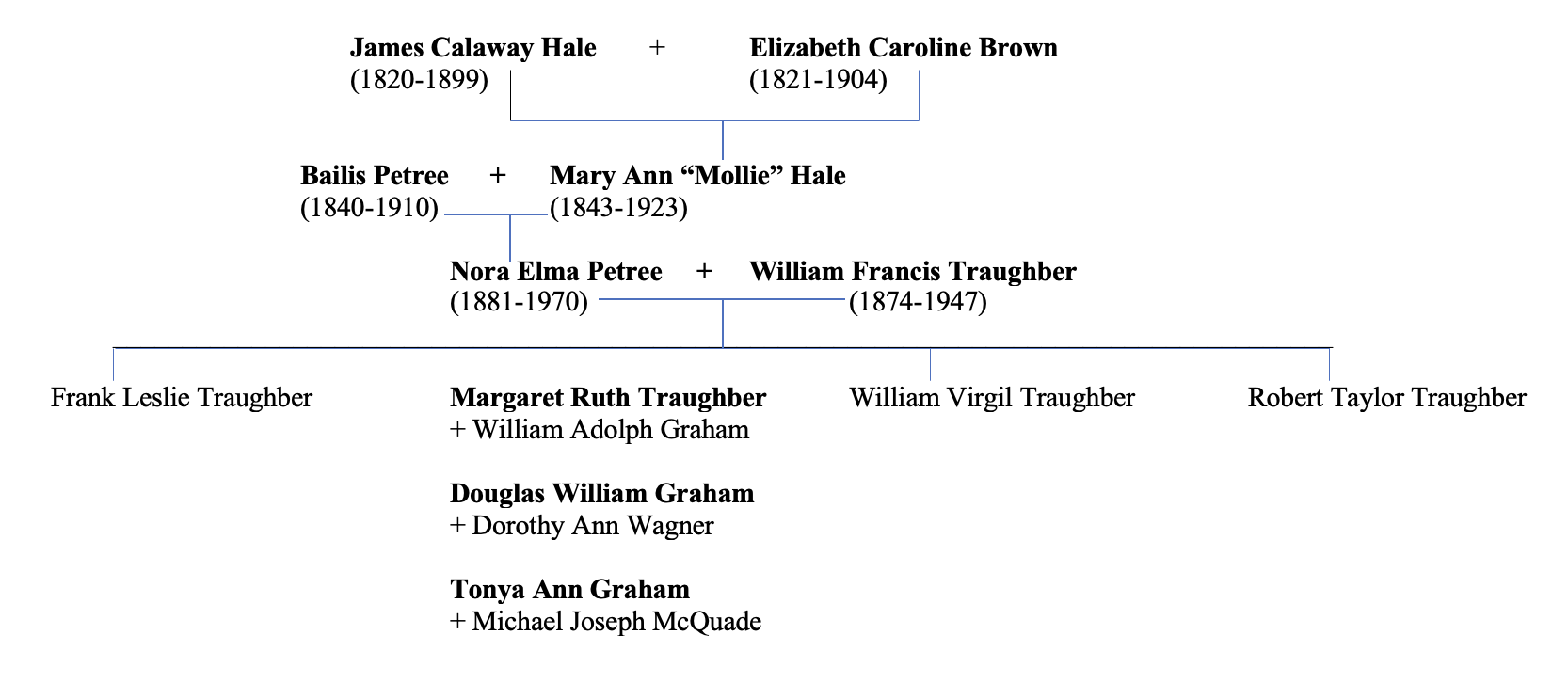
Family Tree showing my connection to James C. Hale and Bailis (and Benjamin) Petree
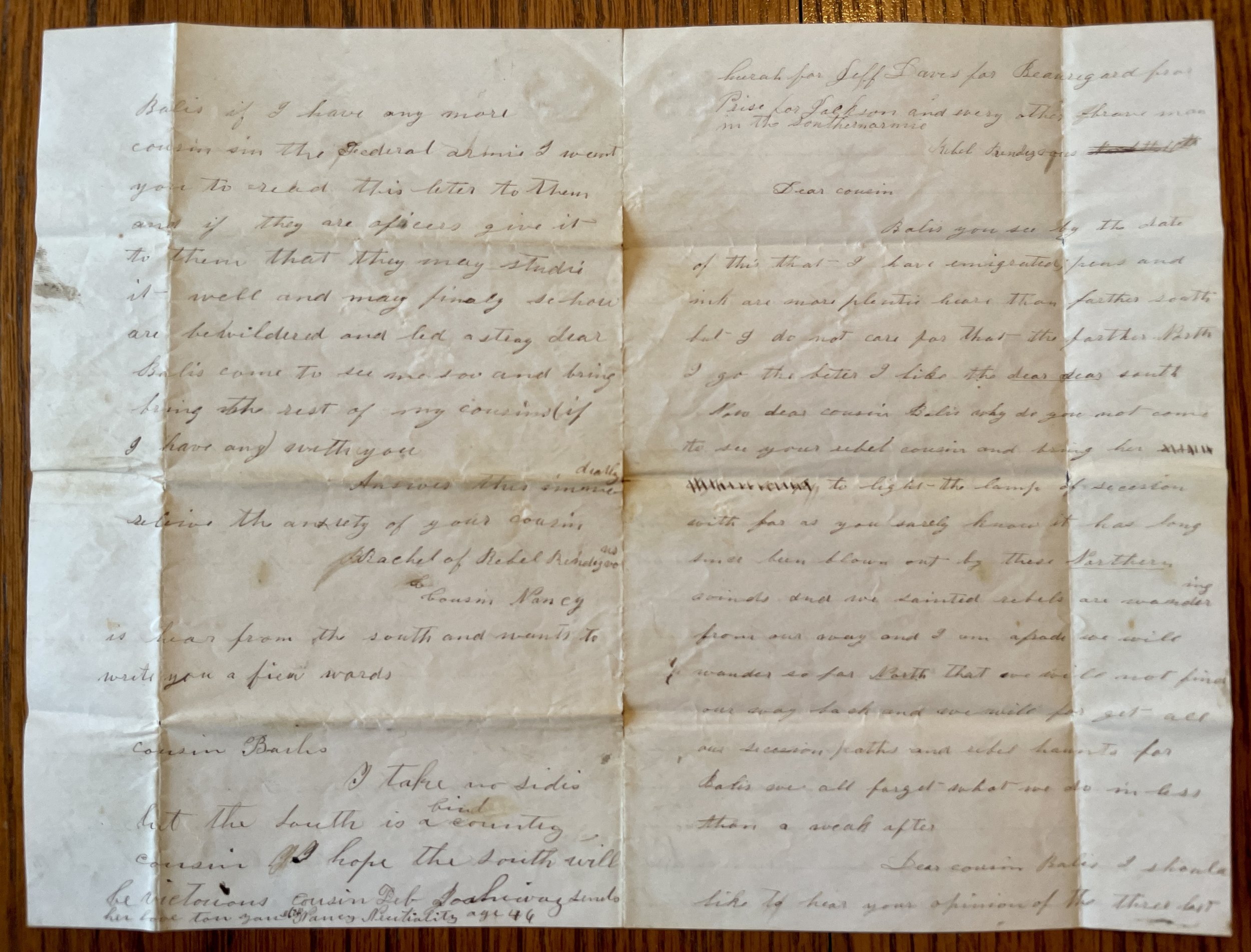
Pro-Confederate letter from cousin "Rachel at Rebel Rendezvous," with a note from another cousin signed "Nancy Neutrality"

Family Tree of Eliza Jane Kennedy Hale, wife of James's brother Meshack, who was killed by Conferderate sympathizers in 1861 in Andrew County

Letter written by Benjamin Petree, dated January 18, 1865, and sent from Pocotaligo, South Carolina, after he had joined up with Sherman's army

Headstone for Benjamin Petree, his wife Lucy, and son George at Antioch Christian Church Cemetery in Savannah, Andrew County, Missouri

Book about the Kennedy Train, led by Jane's brother, Capt. John Knox Kennedy, which she joined along with her son William as they journeyed along the Oregon Trail to a new life in Walla Walla, Washington

Letter from nephew Lewis Hale, dated January 29, 1858, from the Petaluma Valley in California